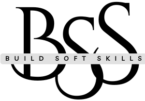
The fast-changing job market requires more than just technical knowledge. Soft skills, those invisible abilities, are essential for excelling at work. Effective communication, problem-solving, and emotional intelligence are the traits that set us apart. Developing these skills opens doors to new opportunities and propels career growth.
Key Takeaways
- Soft skills are the intangible abilities that complement our technical expertise.
- Mastering soft skills is essential for career advancement and success in the workplace.
- Soft skills like communication, problem-solving, and emotional intelligence are highly valued by employers.
- Developing and showcasing your soft skills can help you stand out in a competitive job market.
- Continuously improving your soft skills can lead to increased job satisfaction and greater professional opportunities.
What are Soft Skills?
In today’s fast-paced work world, soft skills are key. They help us work well with others and solve problems. These skills are based on our personality, how we interact with people, and our problem-solving skills.
Defining the Intangible Qualities
Soft skills help us talk, work together, and fit into different work settings. They are the skills we use with people, not just the technical skills for a job. Examples of soft skills are critical thinking, creativity, empathy, managing time, and leading others.
Distinguishing Soft Skills from Hard Skills
Hard skills are the technical skills we learn for a specific job. They can be measured and shown clearly. Soft skills, on the other hand, are versatile skills we use in many areas. They help us succeed in any field. Hard skills come from school or training, while soft skills come from life, thinking about ourselves, and learning new things.
Knowing the difference between soft skills and hard skills is important for growing personally and professionally. Having both skills helps us do well in our careers and be flexible in a changing job market.
The Importance of Soft Skills in the Workplace
In today’s job market, employers look for soft skills more than ever. These skills make us better at what we do and show we can work well with others. By improving our soft skills, we stand out, find new chances, and set ourselves up for a bright future.
Soft skills are key for many reasons:
- They show we can solve problems, think deeply, and make good choices, which is crucial in fast-paced jobs.
- Good communication and people skills help us connect with others, handle tough relationships, and work well with our team.
- Being emotionally smart lets us control our feelings, understand others, and make our workplace positive and productive.
- Being adaptable and open to learning new things keeps us up-to-date and helps us meet our company’s changing needs.
Working on soft skills can make us stand out and lead to a successful career. By growing personally and showing off these skills, we become more valuable to employers. This opens doors to new chances that match our career goals.
| Soft Skills | Hard Skills |
|---|---|
| Communication | Coding |
| Teamwork | Data Analysis |
| Problem-Solving | Project Management |
| Critical Thinking | Graphic Design |
| Adaptability | Accounting |
“Soft skills are just as important as technical abilities. Employers are looking for well-rounded candidates who can collaborate, communicate, and think critically.”
By understanding the importance of soft skills and working on them, we can boost our career chances. This helps us succeed in the long run at work.
Top Soft Skills for Career Success
Today, employers look for more than just technical skills. They want people with strong soft skills like communication and problem-solving. These skills help us work better with others and think critically.
Communication and Interpersonal Skills
Being able to communicate well is key to doing well in any job. It means we can share our ideas clearly and listen well. It also helps us build strong relationships with our coworkers and clients.
Skills like empathy and teamwork let us work together smoothly. They help us solve conflicts and get along with others at work.
Problem-Solving and Critical Thinking
Businesses change fast, so being able to solve complex problems is important. Critical thinking lets us look at situations from different angles and find new solutions. This makes us more valuable to our companies and helps us move up in our careers.
By improving our soft skills, we can open up new opportunities in our careers. We become more effective at what we do and make a bigger impact at work.
Developing and Showcasing Your Soft Skills
Improving our soft skills is key to career growth. These skills help us stand out and be seen as valuable in the workplace. To get better at them, we can try different activities and strategies.
Strategies for Improving Soft Skills
One good way is to work on active listening. By really listening to our coworkers, we improve our communication and show we care. Also, speaking up in meetings can boost our confidence and help us share our ideas well.
Getting feedback from others is also helpful for soft skills development. Colleagues, mentors, or coaches can give us insights on what we’re good at and what we need to work on. This helps us focus our efforts to get better.
Highlighting Soft Skills on Your Resume
When we put our soft skills on our resumes, we should be smart about it. Instead of just listing them, we should show how we used these skills to get real results. Giving specific examples and numbers makes our skills clear and shows our worth to employers.
We can also look at the job ad to see which soft skills are key for the job. Then, we can make sure our resume shows those skills. This way, we match what the employer wants and show we’re a good fit.
Conclusion
Soft skills are key for career success. These intangible abilities help us stand out and grow in our careers. By focusing on these skills, we can beat the competition and move forward in our jobs.
It’s important to see the value of soft skills over just technical hard skills. Employers want people who can communicate well, solve problems, and work together. By improving our soft skills development, we make our resume stronger and show we’re adaptable.
Let’s keep working on our soft skills to help us succeed in our careers. By focusing on these skills, we open up more opportunities for ourselves. This way, we can grow and be fulfilled in what we do.
FAQ
What are soft skills?
Soft skills are the personal traits and abilities that help us work well in the workplace. They are the qualities that make us good at working with others and solving problems. These skills are important and can’t be easily measured.
How do soft skills differ from hard skills?
Hard skills are specific skills needed for a job, like coding or writing. Soft skills are more general and help us work with others, communicate, and solve problems. They are key for teamwork and getting along with people at work.
Why are soft skills important in the workplace?
In today’s job market, having soft skills is crucial. Employers look for these skills when hiring and promoting people. They show we can work well with others, think on our feet, and solve problems. This makes us more adaptable and valuable at work.
What are some of the top soft skills for career success?
The top soft skills include communication, problem-solving, and critical thinking. Being able to communicate well helps us share ideas and work with others. Problem-solving and critical thinking let us tackle complex issues and find new solutions.
How can we develop and showcase our soft skills?
To improve our soft skills, we need to know ourselves, practice, and show our skills to others. We can get better at listening, empathy, and speaking in public. It’s also important to talk about our soft skills in our resumes and during interviews. This helps employers see how we can add value to their teams.

